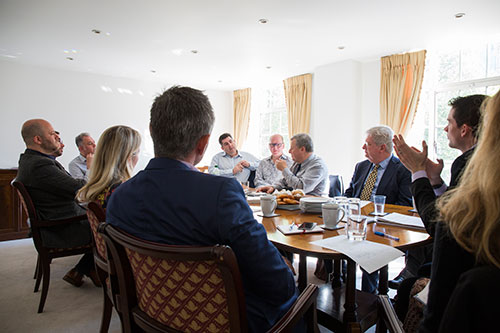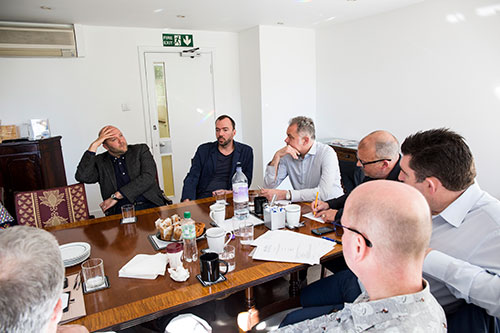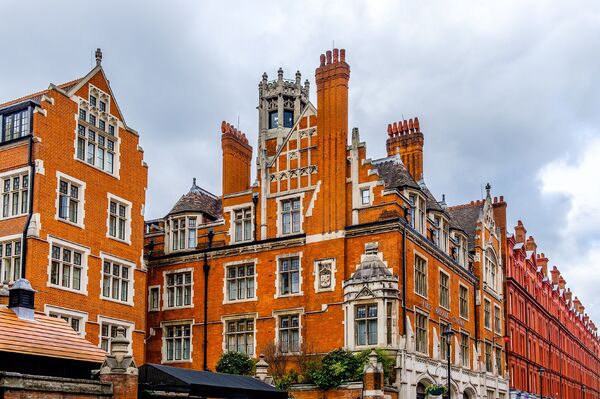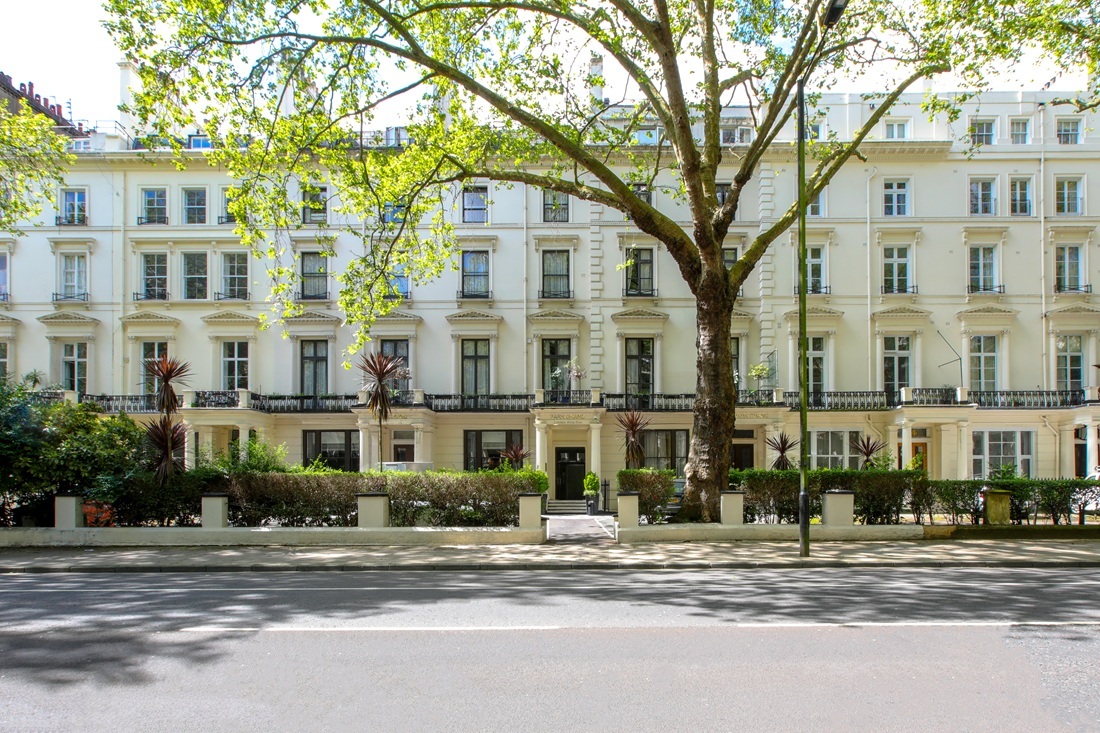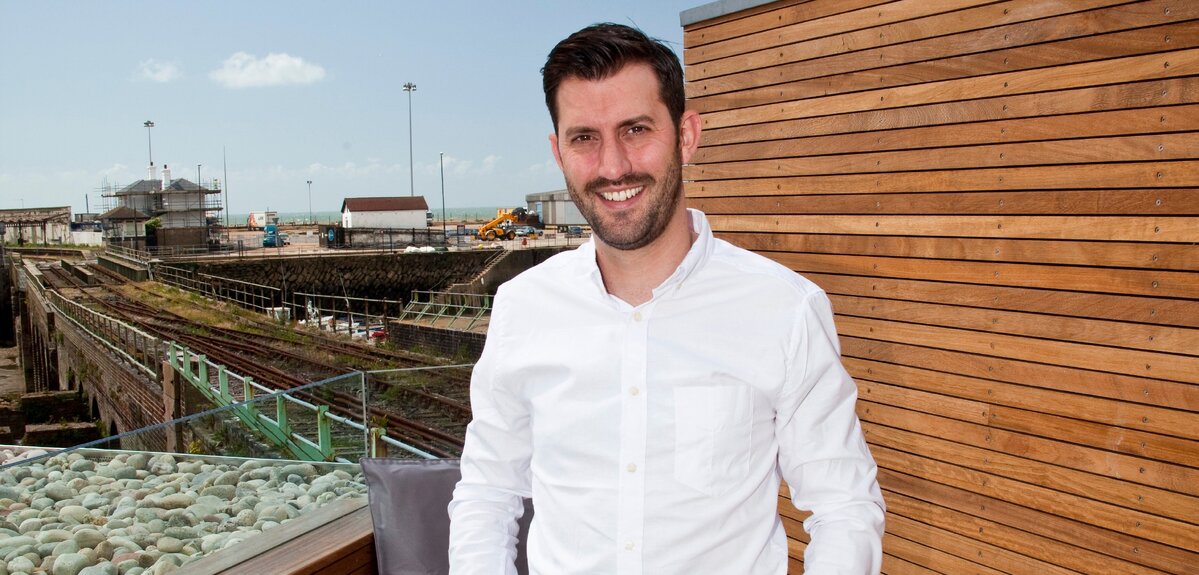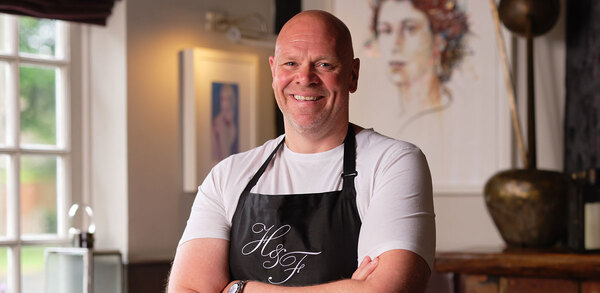The clear case for tips, service charges and troncs
On 3 May, the government completed its review of tips, service charges and troncs, and gave the industry until 27 June to influence the consultation process. To gauge the mood, The Caterer, supported by WMT Chartered Accountants, hosted a round table of industry employers to thrash out the issues, the hurdles and the best outcomes. Rosalind Mullen was there
The attendees











How do you approach tipping and service charge in your own restaurants?
Joel Kissin (JK) We have a tronc system, so tips are distributed through the tronc master.
Nick Gibson (NG) We have a bar-restaurant downstairs and a dining room upstairs. Upstairs we add discretionary service charge but not downstairs unless for large group bookings. Most dining guests pay by card and when we hand guests a machine downstairs there is an option to add a tip. They often ask if staff get it and if there is a benefit to them leaving cash - there isn't as all ‘service charge', voluntary additions to card payments and cash are pooled in the same tronc system. We have a £10 administration fee each payroll, which would be associated with around £2,500 in tronc. We don't deduct for the credit card fees we pay on the service charge and tips that would significantly exceed our admin charge.
Serena von der Heyde (SH) We are a B&B hotel, so staff get cash tips which they distribute themselves. We don't have a service charge.
Chris Yates (CY) We run a discretionary service charge in the restaurants. We have a tronc committee, but keep an eye on it, as it goes through pay-roll. We make sure there are no abuses by the troncmaster as this can happen.
We don't get involved in cash tips and we think that it works well. We have always found it popular with staff as it gives a stable income. That wouldn't be the case under a voluntary system.
Lawrence Hartley (LH) We put the discretionary service charge into the pay-roll. It is much easier to say to waiters, "this is what you will earn". It was initially a problem, but we had inherited a difficult business. We needed to put in more efficient systems. It gave us control of our decision-making and we know that everyone is earning above the minimum wage. We could revert back if necessary.
Peter Davies (PD) Businesses such as Côte and Bill's [which were accused of using the service charge to top-up minimum wages] got lambasted. Is it a concern that someone could say you treat service charges as revenue?
LH It comes back to communication. The whole thing is a mess from the consumer point of view. They want to understand. We state that it is an optional discretionary gratuity and refer them to our website. The most common reaction [if they don't like it] is that they will leave cash.
Is public perception an issue?
Tim Healy (TH) It is a problem, as people don't understand what it means to be a restaurateur.
LH People don't understand the difference between a service charge and a tip.
JK If the business keeps the service charge and passes the saving on to the customer, it needs an explanation. The public now think that we keep the money. They don't understand the complexities regarding tax, National Insurance and so on. Danny Meyer in New York has banned the service charge in his restaurant, but it wouldn't work here because he has had to put prices up by 35%.
NG We hand guests a machine to add the service charge. They often ask if staff get it and may leave cash. We have a payroll administration fee, but we don't charge a credit card fee, so treat it like a tip. We raise £2,500 a week on average in tips. It is muddied by [people] who don't know how it works.
SH It is not always made clear to staff either. When they are asked by a customer, they often give the wrong message.
Are you worried the proposals could affect the way you divide discretionary payments for service among your staff?
Tony Sophoclides (TS)
Francesco Cappucci (FC) It is about communication and transparencies. From food to reception â" everyone makes that experience work.
What concerns you about the proposals?
PD The document that the government has put forward could have some detrimental effects if all the options were implemented. The government talks about possibly prohibiting administration charges. I agree we need transparency for consumers and staff and some businesses have historically seen a chance to profit from this. But thereâs established EU case law on this â" although if Brexit happens, who knows what that will be worth?
JK We may have to put prices up by over 20% if service charge is included. With service remaining a separate line item, people can choose not to pay it. In addition, if it is incorporated into the price, there will be a staggering increase in taxes. Danny Meyer is very successful, and by increasing prices he is increasing the tax that customers in the US pay on the bill.
Are there any positives?
NG Yes, if it makes the system clear and customers know that staff are protected.
SH Transparency is important. Few people know that there is tax to be paid on some tips.
Is it possible to simplify the system by getting rid of the service charge altogether, or would changing the wording help?
PD Service charges keep the business costs down, help employment and maximise the income of staff. It also keeps menu prices down. If we throw this model away, it will bring extra costs into the system. With £100 service charge, the Revenue gets £20 and staff get £80 and the cost to the business is zero. If you get rid of it and go to all-inclusive pricing, you need £171 to get that.
LH We pay a fixed hourly rate and the surplus [from service charges] gets ploughed back in across the year. We just want a wording change [on the bill] to â12.5% service charge includedâ so that the consumer knows. We offset against the payroll â" we put the whole amount into the payroll.
JK The wording on menus regarding the service charge could be standardised so it is clear to the public how it works. By 2020 we will have a £9 per hour National Living Wage [NLW], and because prices will have to rise, we may end up reducing the amount of the service charge anyway.
PD And as the NLW floor rate grows, top earners will want incrementally more, so when it is £9, more skilled workers will want £11.
How alive to the concerns of the restaurant industry do you think the government is?
TS The Department for Business, Innovation & Skills [BIS] is dealing with a lot of issues. We met with the BIS last week. We said that we want transparency and the burden on operators to be kept to a minimum, with due consideration to employer costs and legal pressure on the industry. And we pointed out that our industry is already looking at a potential skills crisis in three yearsâ time.
PD There are rents, pensions, the National Living Wage, the apprenticeship levy â" these are all in the pipeline and might increase prices further.
JK The government wants inflation, and people who receive better wages will be spending more, so it all feeds in.
PD When the government looks at revenues, the sector is an effective collector of tax on this. Service charges are a legitimate part of income. If we move back to cash tips or even an app to tip waiters, it will be invisible to the Department for Work and Pensions again. At the moment, it is above board and declared. There will be a law of unintended consequences.
CY None of us want the service charge outlawed and that is a good argument for it.
How should the industry respond â" is 27 June a reasonable deadline to put the sectorâs views across?
PD The consultation period [of eight weeks] is too short. We must show there are consequences to the options. It strikes me that only one side of the argument is shouting loud enough in the media and social media. government responds to that. It needs industry representatives to say, âyou may solve one problem, but another one will pop up hereâ.
There have been some 183 respondents, of which 49 are employers and 13 from individual operations. People donât want to put their heads above the parapet.
LH How [tipping] represents the industry is my concern. If you go to Pret or McDonaldâs, you donât tip. It is confusing. The consultation period is too short and so we will be stuck with something that will need to change. In the short term, people will leave tips, but the new generation isnât as generous.
PD Most customers will pay a service charge. If we are moving to a pricing model [with everything included in the menu price, rather than menu price plus service charge], we are removing the element of choice.
LH Where can you apply a service charge?
PD Only part of the sector is affected. There is no impact on operators such as Pret, but gastro-pubs, casual dining, hotels and fine dining will be affected. We want to protect [service charges] because of the benefits, but the onus is on us to get on the front foot and to say this is where it goes and what it does.
Why do we need a service charge?
NG Service charges do incentivise good service and make people happier.
JK If you go to a shop you donât leave a tip, so people ask why we have a service charge in restaurants? They need to understand we are a manufacturer and a retailer under one roof. A shop just sells, but in a restaurant we buy raw materials and create food. They have five staff, a restaurant has 20. That is why we need service charges. If you honestly appraise pricing in restaurants, you should probably double the food prices and half the wine prices, but you canât do that.
It is a complex issue and because most of the public and many of the industry do not understand it, we need to explain it better.
What are the best- and worst-case scenarios?
PD Best case is that we keep the benefits of the existing system and there is more transparency for staff and the consumer. The worst case is that it is micro-managed, puts on extra costs and destroys profits.
Some of the options stray into micro-managing how tronc systems operate, and by linking this to E24 [HMRCâs guidance] it raises the possibility that this could affect a business qualifying for National Insurance exemption.
CY The worst case is that it will discourage people from joining the industry. The best case is clarification on how we run tronc systems.
A snapshot of the government proposals
It has indicated it wants:
- Restaurants to hand over all tips to employees.
- Charges imposed on staff tips by employers to be scrapped or limited (except those under tax law).
- Service charges on bills to be clear and voluntary.
- To increase transparency for consumers to make it clearer that suggested discretionary payments for service are optional and that consumers are free to choose.
It is also considering:
- Whether to ban or restrict the levying of table sales charges on staff.
- How to incentivise and increase the prevalence of well-managed tronc systems.
- How to update the current voluntary code of practice and put it on a statutory footing to increase employer compliance.
Who gets what? In a nutshell
- Tips included in card or cheque payments
- If you pay these to staff directly, you are responsible for making sure income tax is paid through PAYE.
- If the tips are pooled together and shared out under a tronc system, the troncmaster is responsible for making sure income tax is paid.
- If you decide how the tips are shared out, you are responsible for ensuring National Insurance and tax is paid through PAYE.
Cash tips
- If staff get these directly from a customer, they have to pay tax on them, but not National Insurance.
Service charges
- If the charge is compulsory, itâs not a tip, so if you give it to staff, itâs treated in the same way as wages.
- If itâs voluntary, staff pay tax and National Insurance in the same way as for tips.
- National Insurance is exempt if you donât pay or allocate the tips to employees directly.
Source: www.gov.uk
Â




